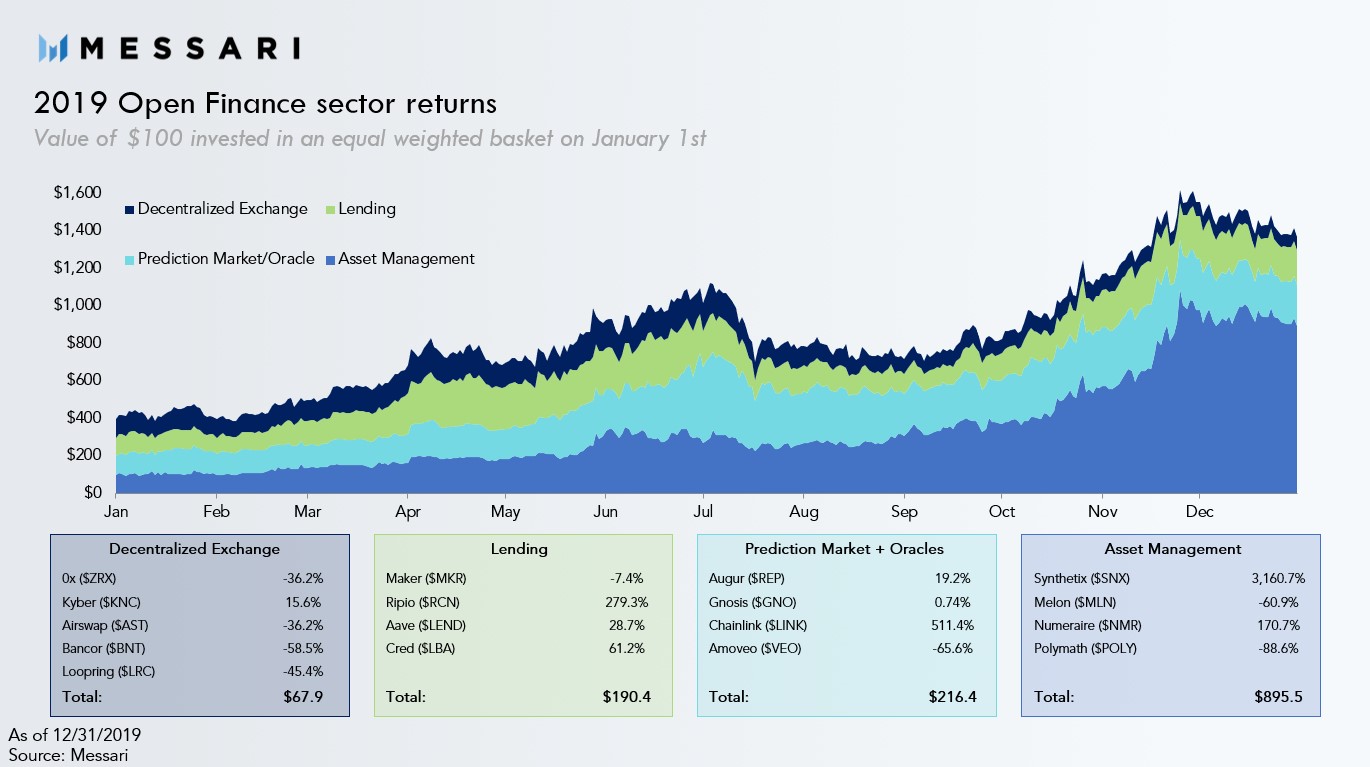Featured | Top 10 content producers in the currency of Twitter; Is Bitcoin 2020 really like the early Internet?
Today's content includes:
1. Top 10 content producers in the currency circle;
2. High DeFi returns depend on usage and value acquisition;
3 Overview of "Stake" in various projects;
- Can distributed search engines challenge Google's dominance?
- If Buffett wanted to buy Bitcoin, what would he buy?
- Opinion | Synthetic tools will become the ladder to the future of DeFi and achieve the popularity of DeFi
4. Is Bitcoin in 2020 really like the early Internet?
5. Progressive decentralization: The script for building cryptocurrency applications.
Top 10 content producers on Twitter
Spencer Noon has launched a top ten content producer on Twitter, with a total of more than 750 nominations. Spencer said that feedback from former Coinbase CTO Balaji Srinivasan and others showed that this nomination produced a high-quality list overall. Here are the top ten on the list:
First Place: Nic Carter Twitter: https://twitter.com/nic__carter
Second Place: Hasu Twitter: https://twitter.com/hasufl
Third place Su Zhu Twitter: https://twitter.com/zhusu
Fourth GreenEggsnHam Twitter: https://twitter.com/HamEggsnSam
Fifth Place: Vitalik Buterin Twitter: https://twitter.com/VitalikButerin
6th Place: Willy Woo Twitter: https://twitter.com/woonomic
7th Place Tuur Demeester Twitter: https://twitter.com/TuurDemeester
8th Place: Chris Burniske Twitter: https://twitter.com/cburniske
Ninth Place Ryan Selkis Twitter: https://twitter.com/twobitidiot
Tenth Place: Scott Melker Twitter: https://twitter.com/scottmelker
Full text link: https://ournetwork.substack.com/p/our-network-issue-3
High DeFi returns depend on usage and value acquisition
Cryptobriefing's research analysis on thinking about high Defi project reports, the main idea of the main article is that Defi is very important, but for DeFi, the token model design is more important.
Investment in DeFi can be divided into two categories: putting funds into the agreement, such as contributing USDC to Compound's currency market, and local tokens for investment agreements. The main focus is on the former, which is largely ignored by the market.
A large number of DeFi applications can be divided into four different tracks: loan agreements, decentralized exchanges (DEX), oracles and prediction markets, and asset management. In general, the returns provided by asset management are higher than other groups, and DEX tokens are the biggest losers.
From Messari's data, if you invest $ 100 in four assets of these four types of track, you can get a return of 796%, while investing the same amount in DEX tokens, you lose 32%.

Although the growth of the Maker protocol is greater than any other financial dApp, the economics of MKR tokens has not been positively recognized by the market. Throughout 2019, Maker has increased the total value locked in the agreement (USD) by 28.4%, while the price of tokens has fallen by 7.4% during the same period.
Synthetix attributes its price behavior to a 105-fold increase in usage. The fundamental difference between Maker and Synthetix comes down to how token holders benefit from their investments.
Just as Maker captured value but MKR lost value, Augur's agreement lost 81.4% of its locked-up capital in 2019, but ended the year with a surprisingly strong performance, eventually closing in with a 19.2% return official.
Ripio (RCN) raised $ 37 million in the ICO, up 280%. This is a relatively unknown project that has received attention in Latin America, but there is no data on the use of the agreement. Coindesk said in a 2018 report that the agreement has 3,000 lenders and loans up to $ 730.
The market often behaves irrationally and treats different situations asymmetrically. Understanding these nuances is essential for those who want to profit from decentralized finance in 2020.
Full text link https://cryptobriefing.com/gaming-top-dapp-2019-defi-value/
Overview of "Stake" in various projects
This is written by Richard Red, a community member of Decred, which is a summary of the simple Staking design of various projects. Richard Red is known for writing governance articles and Decred community development content. The main object of this article is Xiaobai. However, some problems have been raised for many projects. These problems are some essential problems, but many times we naturally ignore them. What are the detailed rules of each project (EOS, TRON, Tezos, Maker, Dash, Decred, Qtum, Algorand, LISK), I will not list them one by one, I only share its preface and main essential questions, as follows:
The term "Staking" is now more widely used, including commissioned proof-of-stake systems and hybrid forms. Many companies now provide and promote mortgage services in which they use escrow funds to participate in these processes and share a certain percentage of the return with customers / depositors. Coinbase, Binance and Kraken all provide such services.
Collateral means putting something of value (such as tokens) at risk to ensure that people will participate in good faith rather than trying to abuse the system. The purpose of this article is to describe the type of "staking" that occurs in different projects by briefly answering a series of questions:
Can the staking process play a role in maintaining consensus? – Does equity (token pledge) play a role in governance? – Is the equity (token pledge) motivated? – Can Staking? – What are the minimum requirements to participate in Staking?
Full text link: https://www.blockcommons.red/publication/staking/
In addition, the author has an extended reading, which is also the "Overview of Governance" written by him, and a well-organized summary of staking and governance, as follows: https://www.blockcommons.red/crypto-governance-research/overviews /
Is Bitcoin 2020 really like the early Internet?
Although there are many such articles and questions, I still like the quote: "Unless you buy bread or steak with Bitcoin, even if he is an anti-censorship medium, it must be converted into other fiat currencies."
At this time, comparing Bitcoin to the "early age of the Internet" is a cliché, but does this cliché really hold?
In the first decade, the ecosystem has evolved faster, with more demand for compliance use cases than Bitcoin can be said for more than a decade today.
In 1994, the New York Times reported that although the user experience was still "slow" and "rough", the company was still "rushing" to build a store on the World Wide Web. Like blockchain technology experts, early Internet companies also encountered scaling issues. . A 1994 Times report stated that the network "has shown signs of suffering because people are racing to access popular databases." However, people have begun to consider using a paywall to distribute content.
Industry insiders are so optimistic about business potential that, in December 1995, Wired magazine, Scott Microneos CEO Scott McNealy predicted "one-time word processors and electronics" priced at use and delivered through Java software Form ".
In the first decade, it became clear that the Internet could be used for business, interpersonal communication, marketing, and education. Already companies use it to make meager profits.
Christopher Allen, founder of Blockchain Commons, said he was "worried" about the lack of bitcoin adoption at this stage, which is why he is so optimistic about solutions like scaling the Lightning Network. Allen said, "Unless you buy bread or steak with Bitcoin, even if he is an anti-censorship medium, it must be converted into other fiat currencies."
In terms of business use cases, Bitcoin may be behind the Internet's timeline, but it has achieved comparable social functions.
Full text link: https://www.coindesk.com/is-bitcoin-in-2020-really-like-the-early-internet
Progressive decentralization: the script for building cryptocurrency applications
a16z's entrepreneurship teaching class, building cryptocurrency applications, the quality of the article is still up, and entrepreneurs should take a look. The main core contents are as follows:
Three factors for the success of a cryptocurrency project. First, I assume that any successful application running on a blockchain computer will have the following three components: Product / market fit. Community participation. Full decentralization (community ownership).
The need for product / market fit is obvious. Without the product people want, there are no users, no business, and it is difficult to sustain the community in the long run. Community participation and decentralized control are less suitable for traditional startups, but they are essential for crypto startups. Why are they so important? The answer is that community participation and control leads to limited platform risk, that is, the risk that platform rules will change against their users' wishes. The Web 2.0 platform has proven the possibility of this misalignment, for example by killing an ecosystem of innovative applications built on its API, or by making a profit at the expense of the privacy or well-being of users.
A cooperative economic model can help ensure that cryptographic services are better aligned with their users as they scale. Another important reason for decentralized community control is regulatory compliance. Under the regulatory framework used by the US Securities and Exchange Commission (SEC), the Howey Test can treat cryptocurrencies that promote economic adjustment as securities. For start-ups, managing the distribution of securities to a wide user base can be challenging and costly, and even Airbnb and Uber haven't figured out how to do it. But recent reviews of the SEC and analysis of law enforcement actions indicate that if the team is able to fully decentralize operations, eliminate information asymmetries or rely on the efforts of the founding team, then true decentralization can enable startup tokens to be removed from securities Sex into non-securities. Create value. A key test of whether an investment can be considered a security is whether investors rely on the efforts of others who expect returns.
As Scott Kupor, a16z's managing partner, previously wrote: "In the pre-internet stage, tokens were often characterized as securities based on Howey's" depending on the efforts of others "test. However, when the network is sufficiently decentralized, in the After the launch of the network, since the holders of tokens no longer rely on the efforts of others, the nature of tokens can change from securities to non-securities. "
Full text link: https://a16z.com/2020/01/09/progressive-decentralization-crypto-product-management/
We will continue to update Blocking; if you have any questions or suggestions, please contact us!
Was this article helpful?
93 out of 132 found this helpful
Related articles
- 36 transactions cleared the HEX investment address, 48,000 ETH were scattered and transferred. It is suspected that the scam project is finally hammered?
- DeFi weekly selection 丨 DeFi lockup value is approaching US $ 1 billion. Will the "ruler" Maker be overthrown in 2020?
- Bitcoin's eternal battle: fighting entropy, rising on the borders of order and chaos
- Perfecting Blockchain Cognition with Bitcoin's Middle Tier Knowledge
- Dry goods | Three technical analysis methods to play the Bitcoin market cycle
- Babbitt Column | Regulatory Sandbox Confirms Difficulties in Implementation, China Should Actively Deploy Industrial Sandbox
- Will the date of CME's launch of Bitcoin options be the end of altcoins?





